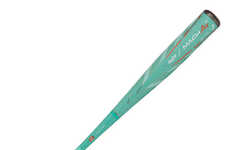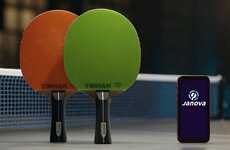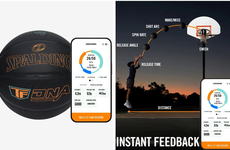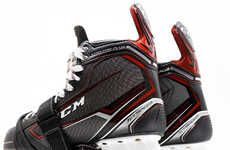
Zepp Lab's Smart Bat Introduces Motion Tracking Capabilities at CES 2016
Laura McQuarrie — January 6, 2016 — Lifestyle
References: zepp & digitaltrends
Sports enthusiasts at CES 2016 will be pleased to know that Zepp Labs is coming out with a Smart Bat, as well as a plan to change the future of sports.
The Smart Bat is designed so that a small sensor can be added to the handle of a bat, enabling motion tracking in a traditional bat design. In addition to being able to check out the Zepp Smart Bat at CES 2016, there will also be a number of other smart sporting goods on display, including tennis rackets, cricket bats and more.
With many wearable devices and apps that analyze sports performance, Zepp Labs has spent years fusing sports and technology. By working with manufacturers, organizers and athletes of all kinds, Zepp Labs hopes to bring about what it calls a "new wave of 'open-source' industry-standard sensor solutions."
The Smart Bat is designed so that a small sensor can be added to the handle of a bat, enabling motion tracking in a traditional bat design. In addition to being able to check out the Zepp Smart Bat at CES 2016, there will also be a number of other smart sporting goods on display, including tennis rackets, cricket bats and more.
With many wearable devices and apps that analyze sports performance, Zepp Labs has spent years fusing sports and technology. By working with manufacturers, organizers and athletes of all kinds, Zepp Labs hopes to bring about what it calls a "new wave of 'open-source' industry-standard sensor solutions."
Trend Themes
1. Smart Sporting Goods - The fusion of technology and traditional sports equipment provides an opportunity for manufacturers to innovate and appeal to tech-savvy consumers.
2. Motion Tracking Technology - The incorporation of motion tracking sensors into sports equipment allows for detailed analysis of performance and opens up possibilities for personalized training programs.
3. Open-source Sensor Solutions - Collaborating with manufacturers, organizers, and athletes to create open-source standard sensor solutions can create a new ecosystem of interoperable sports technology.
Industry Implications
1. Sports Equipment Manufacturing - Innovation in the design and implementation of motion tracking sensors in traditional sports equipment allows for differentiation and appeals to tech-savvy consumers.
2. Wearable Technology - The incorporation of motion tracking sensors in sports equipment provides a new market for wearable tech and presents opportunities for development of new products and features.
3. Sports Performance Analysis - The ability to gather data through motion tracking sensors in sports equipment opens up opportunities for personalized and detailed analysis of athlete performance.
2.2
Score
Popularity
Activity
Freshness























